9 Most Sustainable Alpaca Wool Clothing Brands: The Conscious Consumer’s Guide
Affiliate Disclosure
Hey fellow impactful ninja ?
You may have noticed that Impactful Ninja is all about providing helpful information to make a positive impact on the world and society. And that we love to link back to where we found all the information for each of our posts.
Most of these links are informational-based for you to check out their primary sources with one click.
But some of these links are so-called "affiliate links" to products that we recommend.
Why do we add these product links?
First and foremost, because we believe that they add value to you. For example, when we wrote a post about the environmental impact of long showers, we came across an EPA recommendation to use WaterSense showerheads. So we linked to where you can find them. Or, for many of our posts, we also link to our favorite books on that topic so that you can get a much more holistic overview than one single blog post could provide.
And when there is an affiliate program for these products, we sign up for it. For example, as Amazon Associates, we earn from qualifying purchases.
What do these affiliate links mean for you?
First, and most importantly, we still only recommend products that we believe add value for you.
When you buy something through one of our affiliate links, we may earn a small commission - but at no additional costs to you.
And when you buy something through a link that is not an affiliate link, we won’t receive any commission but we’ll still be happy to have helped you.
What do these affiliate links mean for us?
When we find products that we believe add value to you and the seller has an affiliate program, we sign up for it.
When you buy something through one of our affiliate links, we may earn a small commission (at no extra costs to you).
And at this point in time, all money is reinvested in sharing the most helpful content with you. This includes all operating costs for running this site and the content creation itself.
What does this mean for me personally?
You may have noticed by the way Impactful Ninja is operated that money is not the driving factor behind it. It is a passion project of mine and I love to share helpful information with you to make a positive impact on the world and society. However, it's a project in that I invest a lot of time and also quite some money.
Eventually, my dream is to one day turn this passion project into my full-time job and provide even more helpful information. But that's still a long time to go.
Stay impactful,
Alpaca is often considered one of the finest animal wools. Its resistance to odor helps reduce its washing frequency, saving energy and water. Yet, the growing demand for alpaca wool raises ecological and animal-right concerns, not unlike the sheep and goat wool industries. Furthermore, fashion greenwashing makes it even harder for you and all other consumers to determine which alpaca wool garments are truly sustainable. So, we had to ask: Which are the most sustainable alpaca wool clothing brands?
The most sustainable alpaca wool clothing brands are Indigenous, Paka, and Eileen Fisher, which source low-impact, organic fibers; employ full traceability; and strive for circularity. In addition, The Knotty Ones and L’Envers lower carbon emissions and adhere to ethical practices.
Whether you are searching for a coat, a sweater, or a pair of socks to add to your wardrobe without negatively impacting the soil, the water, the animals, and other people, there is a brand for you. So, let’s keep reading to learn more about the most sustainable alpaca wool clothing brands and how they ensure sustainable, ethical practices.
Here’s How Sustainable Alpaca Wool Fabrics Generally Are
Alpaca wool is a biodegradable fabric made with renewable fleeces from alpacas—a species in the camel family that live mostly free-range in their native habitat in the Andes Mountains, grazing on grass and other foliage. During the usage phase, alpaca wool clothing can be washed sparsely, saving water and energy. Consequently, alpaca wool is generally considered a sustainable textile material. However, it is important to take note of the cruel treatment of alpacas in some industrial settings, which questions the ethics of using some alpaca wool products.
“Sustainable: The ability to be maintained at a certain rate or level | Avoidance of the depletion of natural resources in order to maintain an ecological balance”
Oxford Dictionary
To understand the sustainability of alpaca wool, we’ve assessed the life-cycle and each stage’s sustainability. This life-cycle assessment (LCA) is a method to evaluate the environmental impacts of products and materials. Here’s the quick summary of our LCA of alpaca wool!
What makes alpaca wool so sustainable: Alpaca wool is biodegradable and renewable. Fabrics made with this natural fiber are breathable and odor-resistant, leading to a low-impact usage phase. Recycled alpaca wool is considered the most sustainable variety of alpaca wool because using discarded materials to make recycled wool fabrics reduces pressure on land, water, and other resources needed for rearing more wool-producing animals.
Additionally: Alpaca wool fabrics made with fibers from organic and regenerative farming systems are highly sustainable because these natural fibers are cultivated ethically without any added toxic synthetic chemicals and, thus, are fully biodegradable at the end of their life.
Here’s How We Selected the Most Sustainable Alpaca Wool Clothing Brands
The brands on this list were chosen based on their commitment and actions to promote sustainable practices while reducing the environmental impacts of the textile industry.
They are transparent about their materials, processes, and workforce management within their supply chain.
Some brands focus their efforts on reducing waste and optimizing natural resources while others strive to reduce the carbon footprint of their clothes.
All of these brands share the commitment to reshape the textile industry toward a more sustainable and Earth-friendly sector.
These Are the 9 Most Sustainable Wool Clothing Brands
Most Sustainable Wool Clothing Brands
Overall, these alpaca wool clothing brands are sustainable. Yet, they take various approaches to reduce environmental impacts and uphold ethical standards. Let’s dive into each brand and find out more.
Indigenous: Organic, Fair Trade Clothing


“Each piece of clothing we make is not only soft on your skin, but also soft on your earth. Impeccably handmade and unique.”
Indigenous
🌎
How do they ensure their sustainability?
Indigenous ensures sustainability by using exclusively natural and organic fabrics, including alpaca wool from free-range, family-owned herds, USDA-certified organic cotton, and TENCEL™. Thanks to their use of fabrics cultivated from pesticide-free farms, Indigenous helps to keep 400 lbs of pesticides off the land every year. Further down the life-cycle in the manufacturing stage, they use low-impact dyes certified by OEKO-TEX® Standard 100 to be clear and free of harmful chemicals. Their PURE Collection includes undyed items made with alpaca wool and organic cotton. Specifically, by creating a demand for undyed colored alpaca wool, they actively increase the genetic diversity of Peru’s alpaca populations, which are dominated by sourced-after white alpacas and their dye-absorbent white coats.
🌐
How do they ensure their ethics?
Indigenous ensures their ethics by committing to the fair treatment of the artisans who make their clothes and the animals providing the fleece. They adhere to standards based on the World Fair Trade Organization, providing their artisans with safe working conditions and paying them a fair living wage. They also source exclusively from small-scale ranchers who treat their alpacas with care and reverence.
🤝
Are they part of any giving-back programs?
Indigenous has made grants available to many organizations through the Fair Values Fund. These include Daily Acts, AA Foundation, Good World Solutions, Social Venture Network, Green America, Not For Sale, Ceres Community Project, and Turning Green. Additionally, they are actively involved in improving their artisans’ lives, such as providing free training for women, bringing clean drinking water to communities in the arid Andean Highlands, supporting ever-increasing access to quality, low-cost childcare for artisans and quality education for their children.
🛍️
What is their product range?
- Best for: womenswear
- Product range: tops, sweaters, dresses, bottoms, essentials, accessories
- Price range: $$
- Size range: XS–XL
Paka: Outdoor Clothing Made With Traceable Alpaca Wool

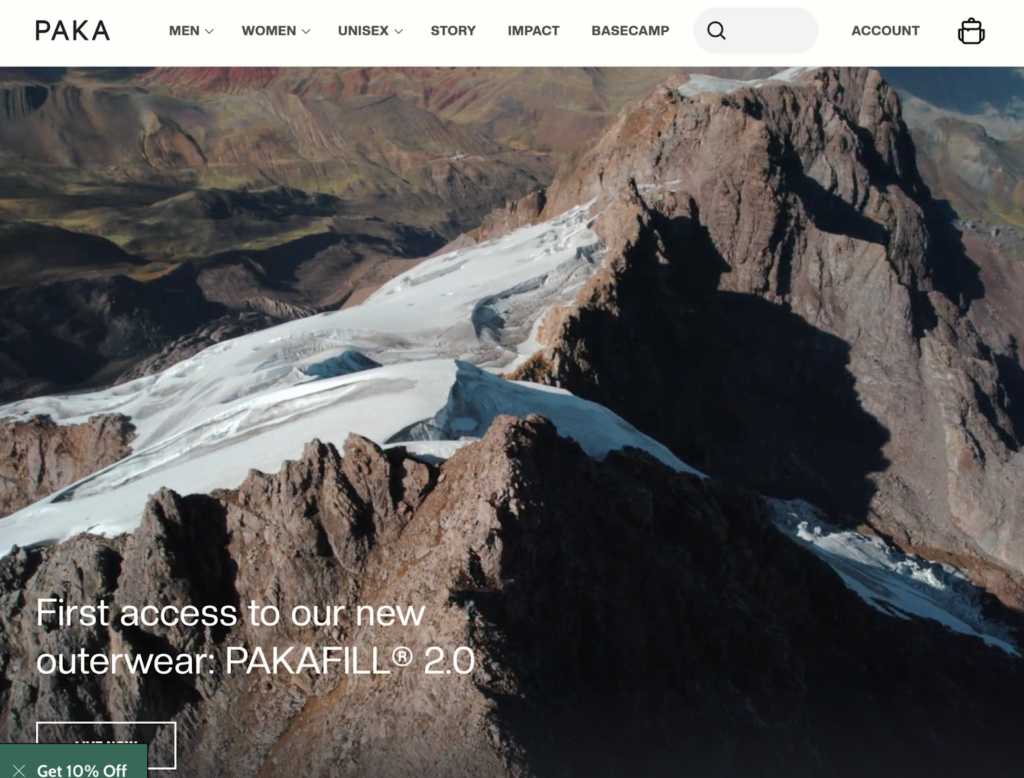
“Paka was created to bring you closer to where your clothing comes from, what it’s made of, and who made it.”
Paka
🌎
How do they ensure their sustainability?
Paka prioritizes sustainability by innovating and making low-impact, high-performing fabrics with ethical alpaca wool. They source alpaca wool from small-scale, family-owned herds. Each herd contains 60 to 90 animals roaming free throughout the Peruvian Andean Highlands. After the fleece is shorn, the fiber is collected and separated by hand before being colored (if needed) with environmentally friendly dyes certified by OEKO-TEX® and GOTS. Half of the energy used in their alpaca wool spinning process comes from solar energy. Further down the life-cycle in the transporting stage, Paka alpaca products are delivered carbon-neutral through their partnership with Ecocart. The packaging is also fully biodegradable. Last but not least, Paka is a B Corporation.
🌐
How do they ensure their ethics?
PAKA ensures their ethics by making their alpaca wool products fully traceable, from free-roaming alpacas up in the Andes Mountains to customers’ homes in the US. The 100+ Quechua women weavers who make Paka’s products are employed by the brand and paid 4 times the family living wage. Regarding alpaca treatment, Paka uses a special technique (Inca Esquila) to minimize the time and stress posed upon the animal during the shearing process.
🤝
Are they part of any giving-back programs?
Through their partnership with Peruvian Hearts, Paka supports the education of underprivileged Peruvian young women with 1% of their annual revenues. Another 1% of the sales supports regenerative agriculture and alpaca families. Additionally, they provide free weaving training for women who want to learn a skill, as well as a “Wawa Wasi” (daycare) in the neighborhood, with full-time supervision and a trained psychologist to enable mothers to go to work. Lastly, Paka is helping to build an NGO that preserves the Inca traditions.
🛍️
What is their product range?
- Best for: women’s and men’s activewear
- Product range: jackets, sweaters, hoodies, baselayer, T-shirts, joggers, socks, underwear, accessories
- Price range: $$$
- Size range: XXS–XXL
Eileen Fisher: A Sustainable Fashion Brand Focusing on Eco-Friendly Materials and Textile Circularity
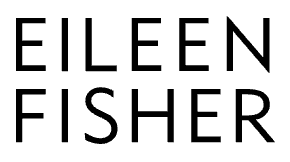
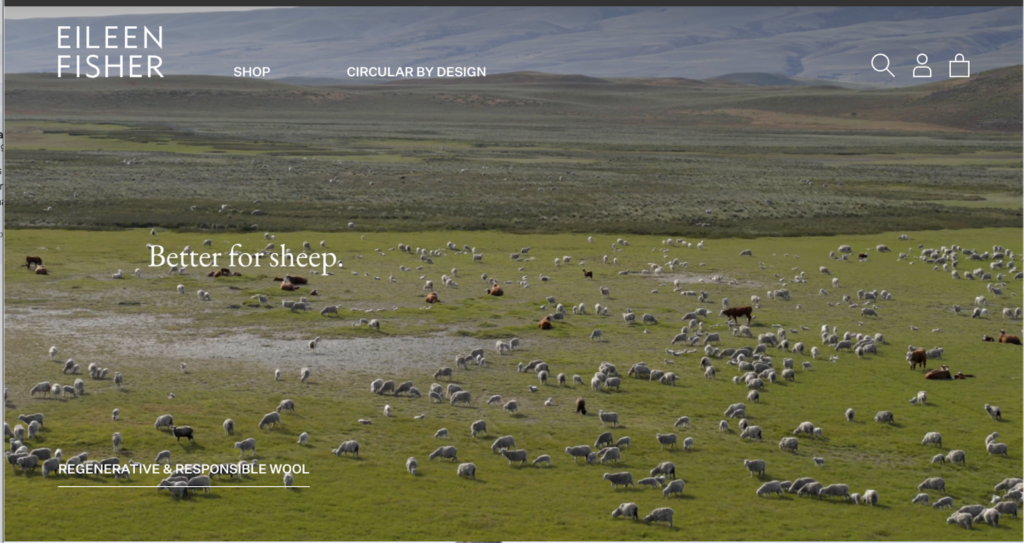
“The Biggest Thing We Can Do Is Reduce”
Eileen Fisher, founder of Eileen Fisher
🌎
How do they ensure their sustainability?
Eileen Fisher’s sustainability efforts focus on using eco-friendly materials, including recycled cotton, organic cotton, organic linen, and hemp, reducing greenhouse gas emissions generated from their operations and supply chain, reducing fabric and corporate waste, and recycling the brand’s used clothes back into new products. Their commitments to sustainable materials, circular systems, and environmentally friendly practices are demonstrated in initiatives like VISION 2020, Horizon 2030, and Renew. They are also certified as a B Corporation and a Bluesign® brand.
🌐
How do they ensure their ethics?
Eileen Fisher is committed to ethical practices. They have worker empowerment initiatives such as collective bargaining and the right to make a complaint. For example, their “Our Love, Peru” project supports over 450 families in and around Arequipa with higher fair trade wages and investments in the local community. Additionally, Their VISION 2020, set in 2015, tackled unethical labor practices. They also have a formal animal welfare policy aligned with Five Freedoms. Additionally, Eileen Fisher follows the Responsible Wool Standard and the Responsible Down Standard, which ensures the humane treatment of animals used for textile products.
🤝
Are they part of any giving-back programs?
Eileen Fisher supports many women-owned businesses. The brand has provided, since their inception, many grants for women, including the current program Supporting Women in Environmental Justice.
🛍️
What is their product range?
- Best for: elegant, classic, and casual women’s clothes
- Product range: dresses, blouses, sweaters, cardigans, pants, skirts and outerwear, shoes, accessories
- Price range: $$$
- Size range: XXS–3XL
The Knotty Ones: Traditional Baltic Knitwear Made Sustainably in Small Batches


“We employ female artisans in rural Lithuania, giving them a living wage, financial independence and a voice in their communities.”
The Knotty Ones
🌎
How do they ensure their sustainability?
The Knotty Ones ensures sustainability by reducing, avoiding, and eliminating plastic, chemical, and textile waste. They use exclusively natural and fully biodegradable yarns for their knitwear. Specifically, they source linen, cotton, merino wool, and alpaca wool for their fabrics while opting for corozo nuts from the tagua tree for button materials. Their Žemiau and Ethno alpaca sweaters are undyed and come with Peru Fair Trade Certification, reducing their chemical use. Lastly, The Knotty Ones operates a “fully fashioned” production model where each sweater piece is pre-ordered, individually shaped, and factory-knitted before being sewn together by hand. This zero-waste approach ensures no deadstock and leftover scraps. Lastly, The Knotty Ones is certified carbon neutral.
🌐
How do they ensure their ethics?
The Knotty Ones maintains their ethics by creating fair partnerships with their female knitters and factory partners. They offer weekends off, living wages, and safe working conditions. Additionally, the artisans who work on The Knotty Ones’s handmade pieces choose their work schedules (part-time, full-time, or while their kids are napping) from the comfort of their homes, with everything they need to work safely and comfortably. Lastly, The Knotty Ones traces and visits their suppliers.
🤝
Are they part of any giving-back programs?
The Knotty Ones is not known to be part of any giving-back programs.
🛍️
What is their product range?
- Best for: womenswear, kidswear
- Product range: sweaters, cardigans, tops, bottoms, accessories
- Price range: $$$
- Size range: XS–XXL
L’Envers: Made-To-Order Timeless Knitwear


“We work hard on a daily basis to design beautiful pieces that are environmentally responsible and that will last you for many years!”
L’Envers
🌎
How do they ensure their sustainability?
L’Envers promotes sustainability by sourcing a medium proportion of lower-impact materials. They use certified organic cotton and certified wool (merino, yak, mohair, and alpaca). Their alpaca wool, in particular, has OEKO-TEX® STANDARD 100 certification and The Alpaca Mark from the International Alpaca Association. Additionally, they knit their clothes on demand and have small batches produced, following their philosophy of slow fashion and anti-consumerism. Lastly, they lower their ecological impact by working exclusively with local partners to reduce their carbon footprint, using low-impact dyes in all products, and avoiding plastic packaging. Lastly, L’Envers is Bluesign certified.
🌐
How do they ensure their ethics?
L’Envers is transparent about where their clothes are made, which materials are used, and who makes the clothes. L’Envers also traces all of their supply chain, including family workshops in Spain, France, and Italy, countries with strict laws and minimum wages that cover the basic needs of their employees. Furthermore, they disclose areas they still need to improve in, as they move toward their sustainability goals.
🤝
Are they part of any giving-back programs?
L’Envers is not known to be part of any giving-back programs.
🛍️
What is their product range?
- Best for: womenswear, menswear
- Product range: knitwear, sweaters, tops, blouses, dresses, pants, hats, accessories
- Price range: $$$
- Size range: XXS–XXL
Stella McCartney: Luxurious Fashion Clothes Made Ethically and Sustainably
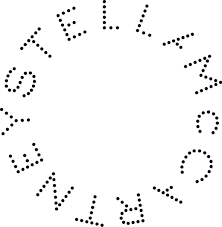
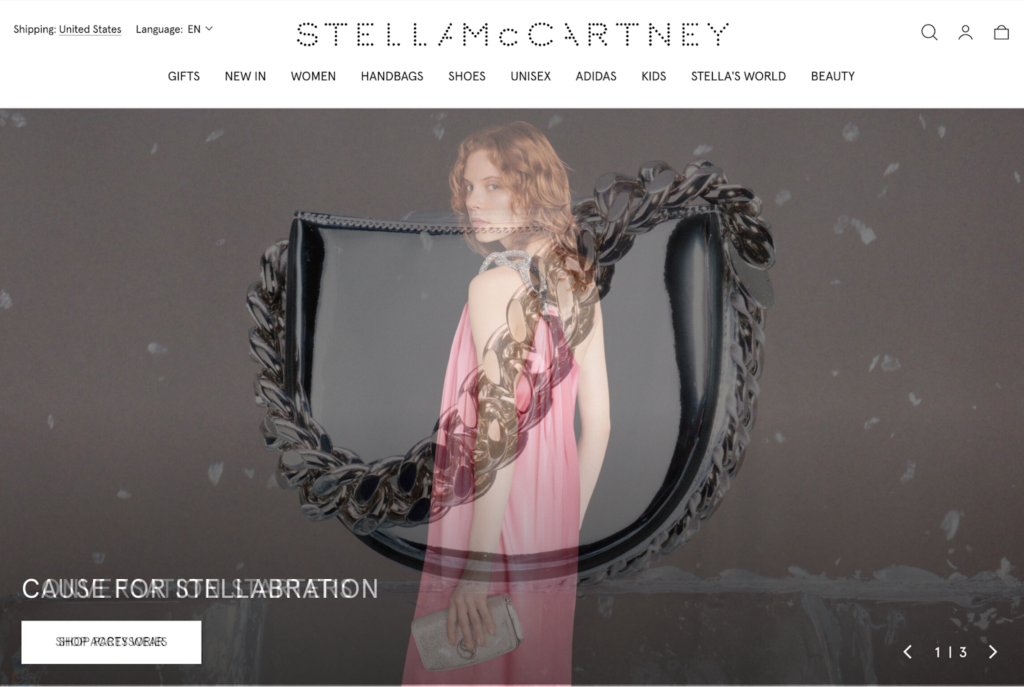
“We are committed to being an ethical, modern and honest company without compromising on luxury or quality.”
Stella McCartney
🌎
How do they ensure their sustainability?
Stella McCartney ensures sustainability by making use of the most cutting-edge and progressive materials that aim to reduce the impact on the planet and are always cruelty-free while following the principles of circularity. They use a medium proportion of eco-friendly and innovative materials, including GOTS-certified organic cotton, cashmere from 100% recycled waste, Re.Verso™, and low-impact plant-based alternative materials (BananaTex®, VEGEA, Mylo™, MIRUM®). Further down the life-cycle, Stella McCartney employs technological advances to trace their products, lower their manufacturing impact, and increase their circularity. Additionally, they exclusively use paper that is either FSC-certified or made from at least 50% recycled content in their packaging. In 2014, the brand launched Clevercare—a garment labeling system covering five simple areas of clothing care: washing, temperature, drying, ironing, and dry cleaning to help extend the life of their garments, decrease the number of pieces that end up in the landfill, and reduce life-cycle environmental footprint.
🌐
How do they ensure their ethics?
Stella McCartney commits to transparency across supply chains through diligent reporting, measuring, and tracking. Stella McCartney is a member of the Ethical Trading Initiative (ETI), a human rights organization driving force in ethical trade. They trace most of their supply chain. Regarding animal rights, they use alpaca wool certified by Responsible Alpaca Standard (RAS), safeguarding the welfare of alpacas and the ecosystems around them.
🤝
Are they part of any giving-back programs?
Stella McCartney partners with and supports many charities, including but not limited to Bioplanet, Million Trees Miami, Naked Heart Foundation, Meat Free Monday, and Sea Shepherd.
🛍️
What is their product range?
- Best for: womenswear, menswear, kidswear
- Product range: shirts, skirts, denim, sweaters, swimwear, dresses, pants, jackets, blazers, hoodies, sweatshirts, knitwear, tops, blouses, T-shirts, underwear, socks, shorts, jumpsuits, playsuits, shoes, accessories, plus size
- Price range: $$$
- Size range: XS–XXXL
Norgäte: Luxury and Sustainable Alpaca Clothing


“Our mission was to seek out exceptional craftsmen, source prime materials, and identify suppliers capable of delivering high-end garments featuring alpaca fiber and pima cotton.”
Norgäte
🌎
How do they ensure their sustainability?
Norgäte ensures sustainability by basing their design strategy around the three Rs: reduce, reuse, and recycle. They utilize only the required yarns or fabrics, eliminate pre-consumer textile waste, and repurpose leftover yarns and fabric remnants. Their Zero-Waste Collection contains items produced in small quantities, which increase only with pre-orders. This is their way to tackle waste and fight fast fashion. Additionally, Norgäte sources low-impact materials, including organic cotton certified by GOTS, soft baby alpaca fiber certified by AZO, OEKO-TEX®, REACH, biodegradable dyes, and compostable shipping bags. Both the sourcing stage for fabrics and organic dyes, as well as the manufacturing stage happen in Peru, minimizing their supply chain’s length and lowering the carbon footprint. Lastly, their apparel comes with an eco-cotton storage bag and dried lavender bag, helping keep garments last longer while being stored in your home.
🌐
How do they ensure their ethics?
Norgäte is committed to fair trade practices with certifications from Fair Trade Peru and the International Alpaca Association. They commit to ensuring the well-being of their knitters, as well as their job stability.
🤝
Are they part of any giving-back programs?
Norgäte has a “buy one, give one” commitment, in which they create cozy alpaca beanies and scarves for Peruvian children, and alpaca ponchos and insulated covers designed especially for the youngest baby alpacas during the coldest time of the winter.
🛍️
What is their product range?
- Best for: menswear, womenswear
- Product range: coats, jackets, sweaters, vests, hats, scarves,
- Price range: $$$
- Size range: XS–L
Achiy: Slow-Fashion Clothing Made With Natural Materials in Partnership With Artisans


“In the best possible harmony with nature, we create limited collections with sense, which offer an absolutely suitable answer to the fast fashion industry.”
Achiy
🌎
How do they ensure their sustainability?
Achiy approaches sustainability by exclusively using certified yarns of known origin that use biodegradable dyes approved by AZO, OEKO-TEX®, and REACH. Their alpaca wool is certified by the International Alpaca Association, ensuring quality and durability, while their organic cotton is GOTS-certified. For the “Designed by Another Life” labels on their products, they use pineapple leaves, which are normally a by-product but are now processed into alternative leather. Regarding carbon emission reduction, they use reusable packaging that can be used for at least 20 order cycles from their warehouse to our customers and back. Additionally, Achy’s clothes are made in small batches, celebrating the craft of the artisans while avoiding textile waste.
🌐
How do they ensure their ethics?
Achiy is transparent about the knitters who make each and every one of their products. Their clothes are produced in workshops that are part of the Fashion Revolution, where artisans are paid fairly for their work.
🤝
Are they part of any giving-back programs?
Achiy encourages consumers to return the RePack packaging that their clothes come in. For every RePack returned, they donate 2€ (3$) to the Kinsacchocha Community in Paru Paru, Cusco, where 10 indigenous families live at an altitude of 4010 meters (2.5 miles).
🛍️
What is their product range?
- Best for: womenswear, menswear
- Product range: sweaters, jackets, dresses, knitwear, scarves
- Price range: $$$
- Size range: XS–L
OZMA: Timeless Essentials Inspiring Mindful Consumption and Waste Reduction

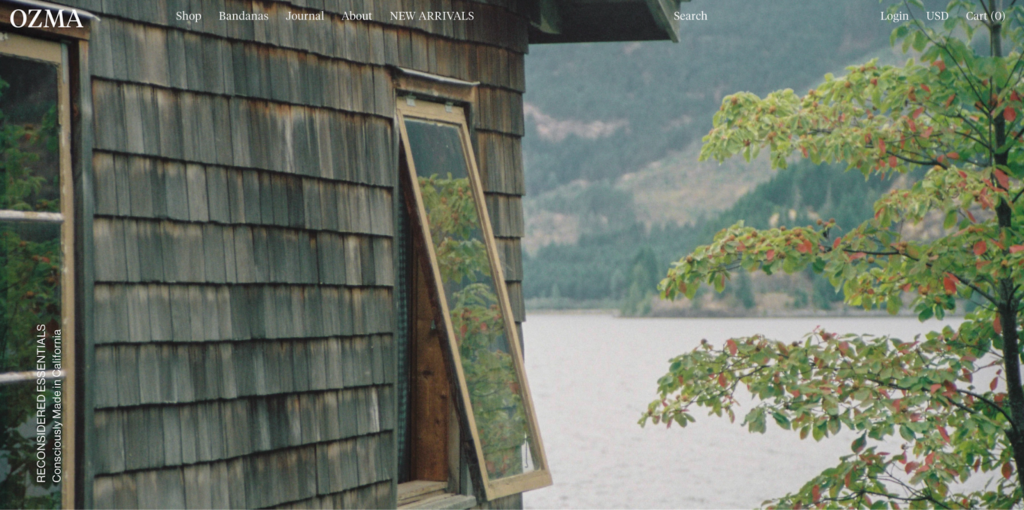
“OZMA designs with the simplicity we crave in mind; dismissing trend and excess in favor of longevity, ease of wear, and adaptability. In offering a smaller edit we hope to inspire the expansiveness that can come from living with less.”
OZMA
🌎
How do they ensure their sustainability?
OZMA ensures sustainability by sourcing natural and plant-based textile materials to lower their environmental impacts, reducing waste with limited production and recycling incentives, and promoting slow fashion with well-made, versatile, and for-all-season garments. OZMA’s garments are made with low-impact fibers, including raw silk, linen, alpaca, and TENCELTM Lyocell. Specifically, they use raw silk, also known as silk noil, yielded from the silk waste of the spun processes and sourced from a regenerative farm with a Bluesign® certification. Additionally, they source GOTS-certified dyes for their garments. Regarding reducing waste, OZMA produces in limited runs to avoid unnecessary inventory and enables textile recycling via their partnership with thredUP.
🌐
How do they ensure their ethics?
OZMA’s clothes are produced in LA- and Peru-based small, family-run factories that are vetted to ensure fair payment, respectful treatment, and safe working conditions for the people who make the clothes. Regarding animals involved, they source their alpaca fibers with Promperu Fair Trade certification, guaranteeing the humane treatment of the animals.
🤝
Are they part of any giving-back programs?
OZMA gives back 100% of profits from their exclusive OZMA Sisterhood Bandana to causes supporting equality, human rights, wellness, and education. They also donate 1% of their overall profit to organizations their team chose.
🛍️
What is their product range?
- Best for: womenswear
- Product range: tops, T-shirts, bottoms, dresses, jumpsuits, sweaters, jackets, accessories
- Price range: $$
- Size range: XS–XL
Alpaca Wool Fabrics: Durable Material From Fine, Odor-Resistant Natural Fibers
Alpaca wool is a super fine and soft material derived from nature, which makes for durable yet light winter gear. Additionally, its high breathability and odor resistance help lower the impact of its usage phase. At the end of their life, pure alpaca wool fabrics are readily biodegradable and suitable for composting.
Here are the life-cycle stages of alpaca wool fabrics and each stage’s sustainability assessment:
- Sourcing of alpaca wool fabrics: The sourcing of alpaca fleeces as the raw material for alpaca wool fabrics is generally sustainable. Alpaca wool fibers are considered a renewable resource. The adverse environmental impacts of raising alpacas are relatively lower than wool-producing ruminants like sheep and goats, largely because of the biological differences between camelids and ruminants. It is even more sustainable to source from responsible, regenerative, organic agricultural systems that ensure the well-being of the animals and the health of the ecosystem. Sourcing recycled wool, alpaca variety included, is also highly sustainable as it avoids more pressure on natural resources (land and water) that are needed for alpaca herding.
- Manufacturing of alpaca wool fabrics: Manufacturing alpaca wool fabrics is typically not very sustainable. It starts with collecting alpaca fleece, and the processes that follow are mostly mechanical. These processes often require a significant amount of energy and water. Alternatively, manufacturing recycled wool has a high energy demand, particularly in regard to breaking down wool waste to retrieve the fibers (shredding or fraying). The mechanical process of breaking down wool waste to recover the fibers often shortens the fiber length and, thus, can’t be repeated indefinitely (to allow recycled wool to be truly circular).
- Transportation of alpaca wool fabrics: Transporting can be a carbon-intensive stage in the life-cycle of clothing items made with alpaca wool fabrics due to the distances covered and emissions associated with transporting vehicles. Alpaca wool fabrics typically travel from pasture lands (virgin alpaca wool) or collection hubs (recycled wool) to processing and finishing factories, sorting centers, shops, and consumers’ homes before going to recycling centers or landfills.
- Usage of alpaca wool fabrics: The usage of alpaca wool is generally sustainable. Alpaca wool requires less frequent washes because it is a breathable, odor-resistant, and somewhat stain-resistant material. Additionally, clothes made with alpaca wool generally have a long lifespan.
- End-of-life of alpaca wool fabrics: The end-of-life stage for alpaca wool is generally sustainable because untreated wool is fully biodegradable and compostable. Blending wool fibers with synthetic fibers increases the strength and durability of the material but reduces their recyclability and degradability.
Alpaca wool is generally considered sustainable thanks to it being a biodegradable and renewable material. Fabrics made with this material are breathable and odor-resistant, leading to a low-impact usage phase. However, there are some ethical concerns in certain alpaca farms as the popularity of this material increases.
Why Is It Important to Buy Products Made of More Sustainable Fabrics
It is important to buy products made of more sustainable fabrics because a sustainable textile industry has a lower carbon footprint, helps save natural resources, and is better for forests, animals, and humans.
Buying Sustainable Fabrics Reduces Your Carbon Footprint
The production of clothing and footwear is estimated to contribute 10% of global greenhouse gas emissions—more than all international flights and shipping combined. If the fashion industry were a country, it would be the fourth largest emitter of carbon dioxide.
One way to reduce the carbon footprint of the clothes you buy is to opt for sustainable fabrics. Sustainable fabrics, which are often made with natural or recycled fibers, have relatively low carbon footprints compared to petroleum-based fabrics. For example, organic cotton made in the US has a carbon footprint of 2.35 kg CO2 (per ton of spun fiber)—a quarter of polyester’s carbon footprint.
Buying Sustainable Fabrics Reduces Demand for Natural Resources and Waste Management
The textile industry uses water and land to grow wool and other fibers. It is estimated that 79 billion cubic meters of water were used for the sector worldwide in 2015. For example, producing a single cotton T-shirt requires as much water as one person drinks for 2.5 years (2,700 liters of fresh water).
Worse yet, the textile economy is vastly more linear than circular: the largest amount of resources used in clothes ended up in landfills (instead of being recycled to remake clothes). According to a report by the Ellen MacArthur Foundation,
- Less than 3% of materials used in the textile economy in 2015 came from recycled sources.
- In other words, more than 97% of resources used in making clothes are newly extracted.
When clothing items are disposed of within a short period of time—under a year in the case of half of the fast fashion clothes—the natural systems that provide raw materials for fabrics don’t have enough time to recover and regenerate, which could lead to ecological breakdown.
Sustainable fabrics are made with less water and emissions while lasting longer:
- Because they are durable, you don’t need to buy new clothes too often.
- Thus, you help reduce the pressure to extract more resources for making new items.
Similarly, making and consuming sustainable fabrics made with recycled materials reduces the demand for virgin materials while helping tackle waste management.
Buying Sustainable Fabrics Encourages Sustainable Management of Forests
Sustainable plant-based fabrics are made with raw materials from forests and plantations that are sustainably managed, such as complying with FSC standards.
When you buy sustainable plant-based fabrics, you discourage unsustainable forestry practices like illegal logging. You can help reduce deforestation, biodiversity loss, and the effects of climate change.
Buying Sustainable Fabrics Encourages Fairer Treatment of Animals
The fashion industry is rife with animal mistreatment when it comes to making animal-based fabrics like wool or silk. Every year, billions of animals suffer and die for clothing and accessories.
Buying sustainable vegan alternatives can help to reduce the pressure on raising more and more animals to meet the demand for animal-based fabrics while sacrificing their well-being and lives.
Suppose you have to buy fabrics made with, for example, wool or silk; make sure you only choose brands committed to cruelty-free products. In that case, you help advocate better treatments for animals raised within the textile industry.
Using Sustainable Fabrics Encourages Fairer Treatment of Textile Workers
Recent statistics from UNICEF estimated as many as 170 million child laborers worldwide, many of whom were engaged in some form of work in the textile industry. They don’t get paid minimum wages and often work long hours.
When you buy sustainable fabrics from brands that are transparent about the working conditions at their factories, you discourage the use of child labor and help promote better working conditions for textile workers.
How Can You Generally Buy More Sustainable Fabrics
The key to sustainably buying fabrics is to check on relevant environmental and original certifications.
For natural fabrics:
- Global Organic Textile Standard (GOTS): A globally-recognized certification system that ensures a certain threshold of organic content has been met. It covers manufacturing, packaging, labeling, transportation, and distribution (but not what happens in the fields where crops are grown).
- USDA Certified Biobased Product: The USDA BioPreferred® Certification is a voluntary certification offered by the United States Department of Agriculture. The certification identifies products made from plants or other renewable materials.
- Ecolabel: Ecolabel is the official European Union voluntary label recognized worldwide for certified products with a guaranteed, independently-verified low environmental impact. The label requires high environmental standards throughout the entire life-cycle: from raw material extraction through production and distribution to disposal. It also encourages companies to develop innovative, durable, easy-to-repair, and recyclable products.
For plant-based semi-natural/semi-synthetic fabrics:
- Forest Stewardship Council: An FSC certification ensures that the wool (or wool-like material) comes from responsibly managed forests that provide environmental, social, and economic benefits.
There are two types of FSC Certification:- FSC Forest Management Certification, with a focus on the origin of the wood—the forest.
- FSC Chain of Custody Certification, which focuses on the path from the forest to the customer’s home.
- Program for Endorsement of Forest Certification: PEFC’s approaches to sustainable forest management are in line with protecting the forests globally and locally and making the certificate work for everyone. Getting a PEFC certification is strict enough to ensure the sustainable management of a forest is socially just, ecologically sound, and economically viable but attainable not only by big but small forest owners.
For recycled fabrics:
- Recycled Claim Standard (RCS): The Textile Exchange RCS was originally developed as an international, voluntary standard that sets requirements for third-party certification of Recycled input and chain of custody.
- The Global Recycled Standard (GRS): The Global Recycled Standard (GRS) is an international, voluntary, full product standard that sets requirements for third-party certification of Recycled Content, chain of custody, social and environmental practices, and chemical restrictions. It can be used for any product with more than 20% recycled material.
For all types of fabrics:
- STeP by OEKO-TEX®: STeP by OEKO-TEX® is an independent certification system for brands, retailers, and manufacturers from the textile and leather industry. It communicates organizational environmental measures, including reducing carbon footprint and water usage.
- OEKO-TEX® Standard 100: OEKO-TEX® labels aim to ensure that products pose no risk to human health (i.e., containing banned chemicals).
Some certifications that are signaling brands’ efforts toward lowered environmental impacts and a circular economy are:
- B Corp Certification: The label B Corp is a certification reserved for for-profit companies. Certified holders are assessed on their social and environmental impacts.
- Cradle2Cradle certification: Cradle2Cradle provides a standardized approach to material circularity. It assesses whether products have been suitably designed and made with the circular economy in mind covering five critical categories: material health, material reuse, renewable energy and carbon management, water stewardship, and social fairness.
Final Thoughts
Alpaca wool fabrics are generally considered sustainable, although there are some ethical concerns in certain alpaca farms as the popularity of this material increases. Responsible, regenerative, and organic wool fabrics are sourced from farms where the welfare of animals and lands are taken care of, leading to higher sustainability. Additionally, recycled wool is among the most sustainable textile materials largely because recycling wool waste reduces pressure on land, water, and other resources needed to raise animals for their hair or fleece.
By purchasing new or pre-loved alpaca wool clothes from brands that commit to sustainability, you support their mission to create a fairer and less harmful textile industry for all lives on Earth.
Here is the list (again) of the most sustainable alpaca wool clothing brands:
- Indigenous
- Paka
- Eileen Fisher
- The Knotty Ones
- L’Envers
- Stella McCartney
- Norgäte
- Achiy
To make your use of these fabrics even more sustainable, follow these steps:
- Buy second-hand, recycled, or upcycled clothes made with responsible, regenerative, organic alpaca wool.
- While using alpaca wool clothes, maximize the number of wears between washes and keep them as long as possible.
- At the end-of-life of your alpaca wool clothes, upcycle the materials to extend their usage and arrange for them to be recycled or properly disposed of.
Stay impactful,

Sources
- Impactful Ninja: How Sustainable Are Alpaca Wool Fabrics? A Life-Cycle Analysis
- Britannica: Alpaca | mammal
- Impactful Ninja: How Sustainable Are Recycled Wool Fabrics? A Life-Cycle Analysis
- Science Direct: Life-cycle assessment (LCA)
- Common Objective: REPORTS & TOOLS | MADE-BY ENVIRONMENTAL BENCHMARK FOR FIBERS
- Indigenous: Home
- Paka: Home
- Eileen Fisher: Home
- The Knotty Ones: Home
- L’Envers: Home
- Norgäte: Home
- Achiy: Home
- Indigenous: SUSTAINABLE ALPACA WOOL | Ethical & handcrafted
- Indigenous: THE ORGANIC WARDROBE
- Indigenous: ECO FRIENDLY TENCEL™
- Indigenous: THE LEADER IN ETHICAL FASHION
- Indigenous: Low-Impact Dyes
- OEKO-TEX: OEKO-TEX Standard 100
- Indigenous: PURE Collection
- Impactful Ninja: How Sustainable Are Organic Cotton Fabrics? A Life-Cycle Analysis
- Indigenous: Our Fair Trade Principles
- Indigenous: Impact Report
- Daily Acts: Home
- Green America: Home
- Turning Green: Home
- Indigenous: Community Grants and Projects
- Paka: Alpaca Wool
- Paka: Traceable Alpaca Fiber
- OEKO TEX: Home
- Global Organic Textile Standard (GOTS): Home
- Paka: Earth
- B Corporation: Paka
- Peruvian Hearts: Home
- Paka: Empowerment
- Impactful Ninja: How Sustainable Are Recycled Cotton Fabrics? A Life-Cycle Analysis
- Impactful Ninja: How Sustainable Are Linen Fabrics? A Life-Cycle Analysis
- Impactful Ninja: How Sustainable Are Hemp Fabrics? A Life-Cycle Analysis
- Eileen Fisher RENEW: Home
- Eileen Fisher: OUR VISION2020 RESULTS
- Eileen Fisher: Our Brand
- B Corporation: Eileen Fisher
- Good On You: Brand Directory | Eileen Fisher
- Eileen Fisher: Community | Love, Peru. Our Fair Trade Project.
- CFDA: HOW EILEEN FISHER IS THE ULTIMATE SUSTAINABLE LABEL
- Seek Capital: 11 Small Business Grants For Women
- The Knotty Ones: Sustainability
- Impactful Ninja: How Sustainable Are Cotton Fabrics? A Life-Cycle Analysis
- Impactful Ninja: How Sustainable Are Merino Wool Fabrics? A Life-Cycle Analysis
- The Knotty Ones: About
- Good On You: Brand Directory | The Knotty Ones
- Good On You: Brand Directory | L’Envers
- L’Envers: Our Organic Cotton Certifications
- L’Envers: Our Wool Certifications
- International Alpaca Association: Home
- L’Envers: Our Philosophy
- Bluesign: Home
- L’Envers: About Us
- L’Envers: Our Artisans
- Stella McCartney: Organic cotton
- Stella McCartney: Recycled cashmere
- Stella McCartney: BananaTex®
- Stella McCartney: VEGEA
- Stella McCartney: Mylo™
- Stella McCartney: MIRUM®
- Stella McCartney: Traceability and Blockchain Technology
- Stella McCartney: Metals
- Stella McCartney: Spotlight on Airslide
- Stella McCartney: Paper and Packaging
- Stella McCartney: Clevercare
- Stella McCartney: Measuring our impact
- Ethical Trading Initiative: Home
- Textile Exchange:Responsible Alpaca Standard (RAS)
- Stella McCartney: Charities
- Million Trees Miami: Home
- Naked Heart Foundation: Home
- Meat Free Monday: Home
- Sea Shepherd: Home
- Peruvian Traditions S.A.C: Home
- Norgäte: Sustainability
- Norgäte: Zero-Waste Collection
- Norgäte: Philosophy
- AZO: Home
- European Union: REACH Regulations
- Fair Trade Peru: Home
- Norgäte: Our Commitment
- Achiy: Our history and mission
- Achiy: Naturalness rethought: Our definition of sustainability
- Repack: Home
- Achiy: ACHIY supports the Alliance for Climate and Development
- Fashion Revolution: Home
- MDPI: Life Cycle Assessment (LCA) of MWool® Recycled Wool Fibers
- MDPI: Textiles for Circular Fashion: The Logic behind Recycling Options
- European Parliament: The impact of textile production and waste on the environment (infographic)
- Science Direct: The challenge of “Depeche Mode” in the fashion industry – Does the industry have the capacity to become sustainable through circular economic principles, a scoping review
- Science Direct: Carbon Footprint of Textile and Clothing Products
- European Parliament: Environmental impact of the textile and clothing industry
- European Parliament: What if fashion were good for the planet?
- Ellen MacArthur Foundation: A New Textiles Economy: Redesigning fashion’s future
- McKinsey: Style that’s sustainable: A new fast-fashion formula
- Forest Stewardship Council: Home
- Our World in Data: Deforestation and Forest Loss
- Our World in Data: Renewable Energy
- Peta: Animals Used For Clothing
- The Guardian: Child labour in the fashion supply chain
- BioPreferred: WHAT IS THE BIOPREFERRED PROGRAM?
- European Commission: Environment | EU Ecolabel
- Forest Stewardship Council
- FSC Forest Management Certification
- FSC Chain of Custody Certification
- Program for Endorsement of Forest Certification
- Impactful Ninja: How Sustainable Are Natural Fabrics? A Life-Cycle Analysis
- Impactful Ninja: How Sustainable Are Semi-Natural/Semi-Synthetic Fabrics? A Life-Cycle Analysis
- Impactful Ninja: How Sustainable Are Recycled Fabrics? A Life-Cycle Analysis
- Textile Exchange: The RCS and GRS are designed to boost the use of recycled materials
- OEKO-TEX: Certification according to STeP by OEKO-TEX®
- B Corp Certification: Home
- C2CCertified: Home




